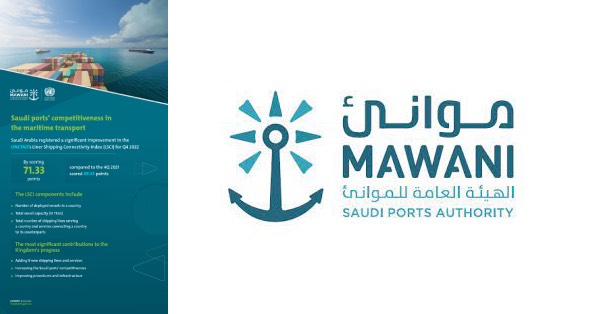The Kingdom of Saudi Arabia has registered a significant improvement in the UNCTAD’s Liner Shipping Connectivity Index for Q4 2022, scoring 71.33 points in comparison to 69.45 points in the last quarter of 2021.
With major gains in leading global indices, the Kingdom is firmly on course towards consolidating its status as a competitive logistics hub linking trade between three major continents in line with the objectives of the National Transport and Logistics Strategy (NTLS). The latest performance is inspired in equal measure by the world-class partnerships forged by the Saudi Ports Authority (Mawani) in collaboration with shipping giants to add nine new services and routes throughout 2022 while working towards bettering the country’s overall LSCI rank to the 80th position.
Issued on a quarterly basis, the LSCI assesses the integration level of countries in the global liner shipping networks with the aim of identifying challenges, uncovering opportunities, and optimizing performance on the logistics front. Its five components include the total number of shipping lines serving a country, largest vessel size (in TEUs), number of services connecting a country to its counterparts, number of deployed vessels in a country, and total vessel capacity (in TEUs).
Earlier, the Saudi ports had topped the World Bank’s Container Port Performance Index (CPPI) for 2021 with King Abdullah Port taking the top spot, followed by Jeddah Islamic Port in the eighth position, and King Abdulaziz Port in Dammam in the fourteenth position.
Last year saw the Kingdom’s maritime regulator receive the Qualified by EFQM recognition by the European Foundation for Quality Management (EFQM), becoming the first recipient of this honor in the national transportation sector, besides acquiring the ISO 22301 and ISO 31000 certifications in business continuity and risk management respectively.









































